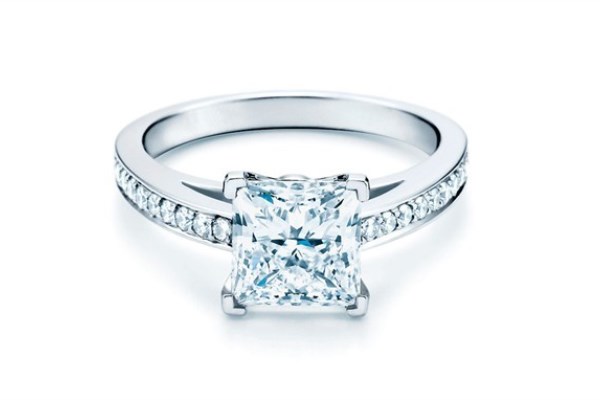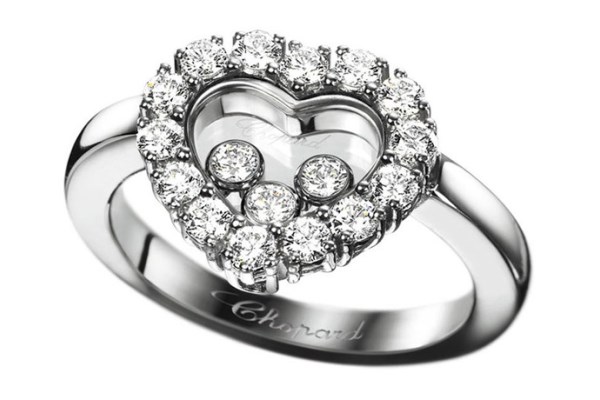
A diamond engagement ring is often the most significant purchase a young couple will make and, unlike the wedding itself, will last the course of the couple’s lives. Here’s how to get a good one in five steps…
This engagement ring from Chopard offers a taste of something very different to the traditional solitaire. Three mobile diamonds (0.17 carats total) and 14 diamonds framing (0.52 carats total).
Weddings are a universal human experience. It might not surprise you then to learn that the engagement ring is not a contemporary commercial invention. Indeed it is not even vaguely modern, the practice having begun with the ancient Egyptians. Those pioneers of civilization transmitted the idea to the Greeks and Romans, who brought it to the rest of the world.
To elaborate briefly, it is thought that the Egyptians were the originators of the practice of maintaining the third finger of the left hand for romantic love. They believed a “vein of love” ran directly from the heart to the tip of the third finger left hand – no hate could stick to this finger and no false pledge ring would fit it. It is believed that this tradition was passed to the Greeks who then transmitted it to the ring-loving Romans.
Well-to-do Romans wore as many as 16 rings but reserved the third finger of the left hand for the love or marriage ring. Both the Romans and the Jewish people of the ancient kingdom of Israel used wedding rings and the Western Tradition has its roots here. In the Roman practice, a ring was passed from groom to bride to signify that the man offered the woman the keys to his household and properties; in accepting, the woman signals that she agrees to care for the same. These rings were sometimes in precious metals, sometimes not. In the Hebrew tradition, the wedding ring had a specific value and was expected to be large, heavy and gold.
To return now to the 21st century and to be specific, we are not speaking in this article only of rings in general, nor even of precious rings, but of purpose-specific engagement rings. To be sure, there is plenty of marketing around the idea of the diamond engagement ring and Hollywood (and Hong Kong too for that matter) have turned the whole affair into occasionally entertaining fare.
You might be surprised to learn that even when it comes to that perfect engagement ring, there is no real gold standard, so to speak. What is a fact though is that the diamond solitaire in Tiffany & Co. prong setting is today considered the classic engagement ring. It developed this reputation sometime after 1886 when Charles Lewis Tiffany, the founder of Tiffany & Co. came up with the design.
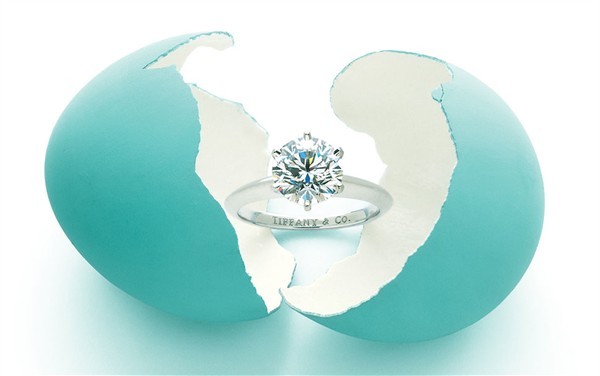
This stylized image highlights what for many forms part of the essential betrothal process: the Tiffany & Co. solitaire (classic six-prong setting) in the famous robin blue packaging
A diamond engagement ring is often the most significant purchase a young couple will make and, unlike the wedding itself, will last the course of the couple’s lives. As we saw in the famous example of the Duke and Duchess of Cambridge, it can even pre-date the couple’s birth. This ring is illustrative of a number of points and we will return to it.
In truth, even the simplest and most modest diamond ring predates any and all humans and will outlast us all. This of course is what all that marketing talk about symbols of eternal love is about.
Since the ring is a symbol of love everlasting, it is necessary to put a great deal of thought and research into it. While our own guide on this subject is far from comprehensive, the steps we have identified will keep you on the right path.
Before we get to the first step, some establishing notes are useful. If you already have a family jeweler or a relationship with a particular jeweler, then you are in a good position and should simply start right there. Trust remains the most important point when it comes to buying jewelry because unless you have the relevant training, you will not know anything about what you buy other than what the jeweler tells you.
Be that as it may, there is something you can know that no expert can and that is what your expectations – as a couple – are. If you have a specific design, setting and stone in mind, the process will be greatly simplified. With that, let us move to step one.
————————————-
Step #1 – ESTABLISH BOUNDARIES
– Remember that an engagement ring is something a couple buys together. Even if the man buys the ring in secret (the road to ruin in this author’s opinion), the ring is still a joint purchase.
– The way it traditionally works is the man sets out how much he is comfortable paying and the woman decides everything else.
– This stage will outline if you will be headed to the majors (Bulgari, Cartier, Chopard and the like) or to a local jeweler; there is a premium of course in buying branded jewelry.
Step #2 – LEARN ABOUT THE FOUR CS OF DIAMONDS
– You need not know the science behind diamonds but the four Cs (cut, color, clarity and carat weight) are directly related to the price of all diamonds.
– It is at this point that a decision should be reached about whether the typical solitaire setting is suitable (for a larger stone) or if some kind of cluster compromise should be considered.
– A large single stone will likely be more expensive than smaller stones that total the same number of carats, all other things being equal.
– You can learn all about the four Cs here but do remember that the carat weight is not a direct indication of size, just weight.
– Color, clarity and carat are determined by nature (weight can obviously be influenced by the hand of man) but cut is entirely about artisanal craftsmanship, or should be.
– A well cut diamond can look larger than an inappropriately cut one.
– Within the limits of the established budget, compromises must be made with regards to the four Cs.
– Make sure any diamond you consider has not been treated in any way to enhance it.
– Whatever you do, always ask for the certificates that accompany the diamonds.
Step #3 – ROMANCING THE STONES
– The Internet is your best guide to the world of diamonds and jewelry, with new resources open to laypeople previously accessible only to professionals.
– Some guides even allow you to learn the price of diamonds via easily useable interfaces.
– At the very bottom of this article, you will find links to the most useful online resources to pricing and researching diamonds.
– Do bear in mind that this is still the free-for-all Internet so results you get should be thought of as estimates.
Step #4 – PLAN THE LONG GAME
– The engagement ring is not just about betrothal. Practices vary but some women may want to wear the rings every day alongside their wedding bands.
– Whether the ring will be worn regularly plays into what kind of ring will be initially purchased.
– One cannot expect to wear the Hope Diamond, for example, set as a ring everyday. Such a massive stone (above 45 carats) of distinction will get in the way of the regular work day! It might also be a traffic hazard and blind random passersby.
– For example, if like the Duke and Duchess of Cambridge, the engagement ring is a significant item of jewelry (with provenance also) then it is only likely to be worn on special occasions.
– For everyday wear, alongside the wedding band, the jeweler should be informed so as to adjust the setting so that the diamond(s) are set higher than the wedding band. This will allow the wedding band and engagement ring to rest alongside each other without an unseemly gap.
– It is worth remembering that HRM Queen Elizabeth II wears a 3-carat diamond engagement ring and she has access to the world’s largest cut diamonds, including the legendary Cullinan I and Cullinan II.
– Some kinds of designs (see above points about large stones) will not allow for the above so bear in mind
– Some couples will agree to increasing the size of the diamond(s) or simply improving quality over the years of the marriage. It is useful to know this at the outset because the jeweler will be able to base recommendations based on this.
– In this case, the jeweler might agree to accept the old diamond as down-payment on the new one.
Step #5 – VISIT A JEWELER
– This step comes alongside planning the long game because one needs to handle and examine the diamonds.
– Once more, it is highly recommended that the couple visit the store together.
– Be as open and honest with the jeweler as possible. Once more, it is important to establish a relationship of trust with the jeweler, especially since you might be a lifelong customer.
#6 – FURTHER READING
– Knowledge is power so arm yourself with following resources.
– Online resources such as Info Diamond and Price Scope are good (casual) pricing guides for diamonds online. Professionals use the Rapaport Diamond Report but this requires a subscription.
– Of the major brands, these have online resources for their bridal offerings: Bulgari, Cartier, Harry Winston, Tiffany & Co. and Van Cleef & Arpels.
– There are many books available on the subject of diamonds and jewelry with diamonds. The following are especially good reads with good information, even for non-specialists.
————————————-
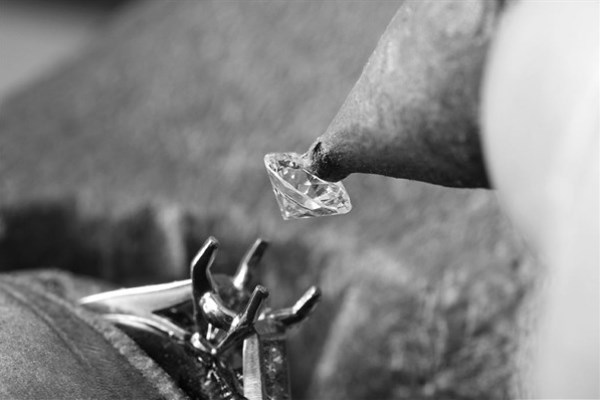
An artisan places the central round brilliant diamond into its band. Cartier offers a special service called Set for You by Cartier, which allows customers to choose a central diamond to mount into a variety of different styles. Most big name jewelers can offer a similar service and it is always worth asking about this. (Photo: Gilbert Nencioli for Cartier)
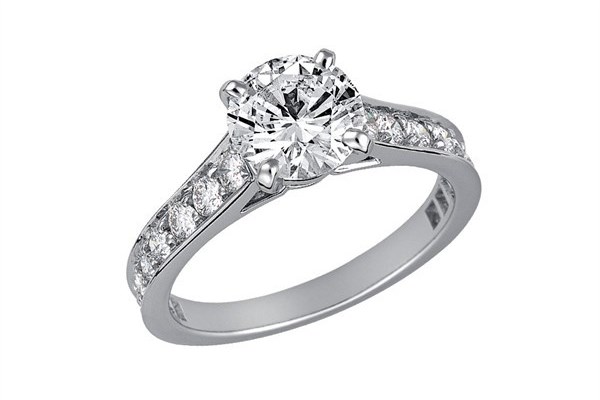
Although Cartier calls this a solitaire setting, specifically the 1895 Solitaire, it does also feature smaller brilliant-cut diamonds on the band. The purpose here is likely to enhance the central stone and to maximize the amount of light that passes through the largest diamond (ranging in this series from 0.3 to 2.99 carats). All the diamonds are brilliant cut and the band is in platinum. (Photo: Katel Riou for Cartier)

The famous Cartier boutique in Paris. Boutiques like this one may look a little intimidating but are well worth visiting, as are the homes of all the big names. (Photo: F. Hammond for Cartier)
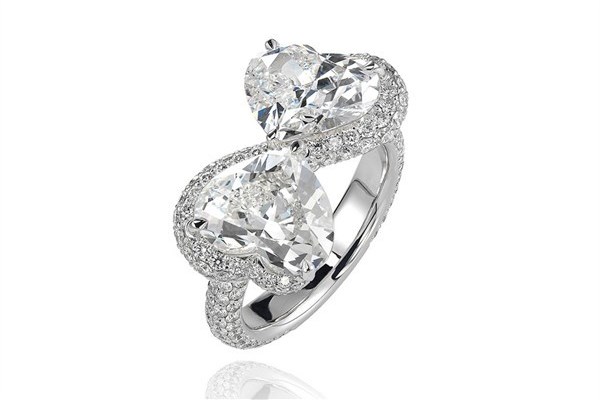
This is an example of a high jewelry ring, from Chopard, that would make a lovely engagement ring. Here we see two heart-shaped brilliant-cut diamonds set in a veritable sea of diamonds (235 to be exact). Even in this extravagant case, the two diamonds are just over 3 carats (3.03 and 3.01), allowing the elaborate setting the chance to shine.
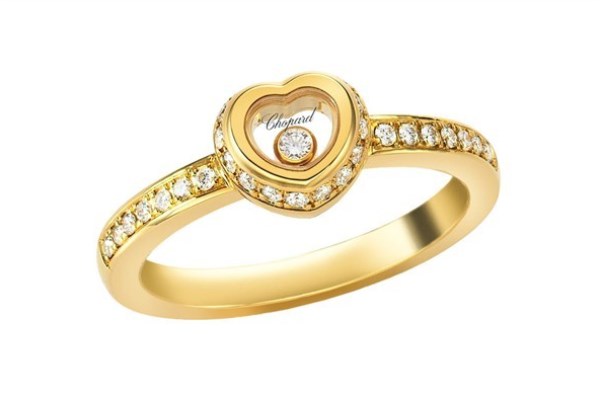
Chopard plays with its signature Happy Diamonds motif in this engagement ring to offer something playful. Once again, it is the setting and the design taking the spotlight here. There are 30 brilliant-cut diamonds on the band and around the heart (0.21 carats) and one ‘floating’ brilliant-cut diamond of 0.03 carats.
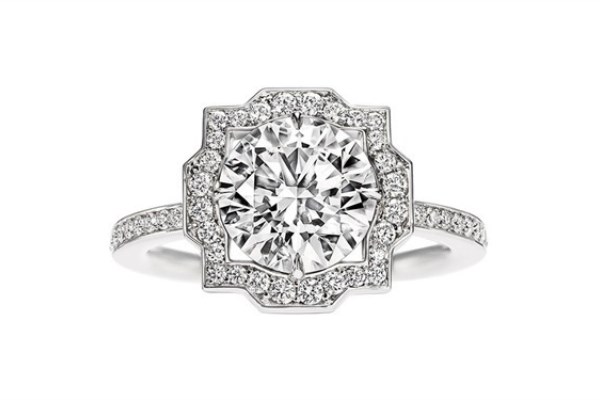
This ring, in the Belle Collection by Harry Winston, illustrates the point that more diamonds are better! The design of the ring, with a large 2.03 carat brilliant-cut central diamond, is wonderfully eye-catching in its geometric beauty. The micro-pave setting adds life to glow of the central stone. The band itself is in platinum.
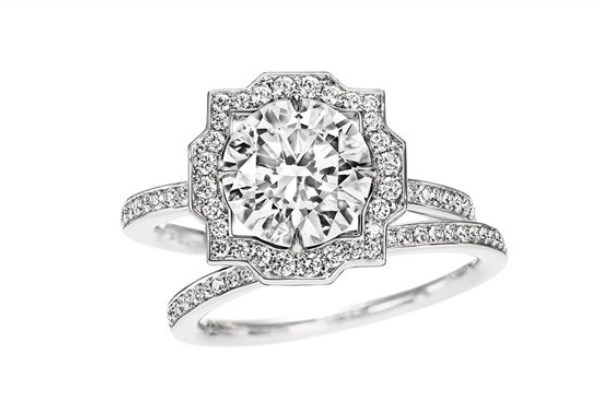
Harry Winston offers a matching Belle wedding band to go with the Belle engagement ring. This band, micro-pave setting and all, has clearly been designed for the woman who intends to wear both engagement ring and wedding band together.
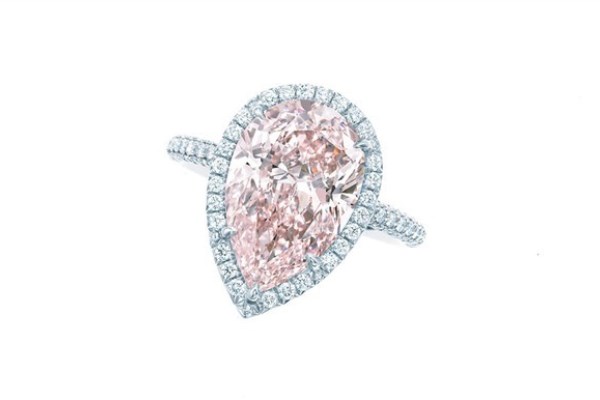
From Tiffany & Co. here we have an a typical engagement ring, with a 4.47 carat pear-cut fancy pink diamond framed by small round diamonds, with round diamonds on the band.
